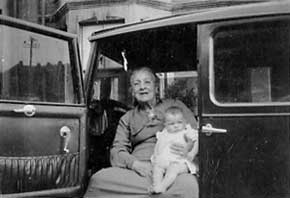How Granny’s chip pan fed the local kids.

Every Friday, chunks of white cooking fat would melt in my granny’s blackened chip pan as she made ready to cook scrumptious long wedges of potato.
“Now take these chips over to Anne,” she’d say in her Scottish burr, “she’ll be waiting for them.”
Enjoy more Best of British Magazine reading every month.
Click here to subscribe & save.
Granny would assign duties as she bustled about her cosy kitchen, and each week it was her mission to serve up golden, crunchy chips to children who lived in our street. She undertook this labour of love with enormous joie de vivre and satisfaction. And dashing home from school I was always just in time to see her chopping up a stack of thick potato fingers ready for the pan.
Stocky in frame, with her fine greying hair secured into a neat coil at the nape of her neck, my grandmother would stand like a sentinel at her kitchen stove as a mouth-watering scent of dissolving fat drifted throughout her house. I waited patiently for my first delivery, and blew on my fingers as she handed me a piping-hot bag of crispy chips.
This was Granny’s brand of potato magic, and not the only thing that triggered memories of her. Granny loved Guinness; that roasted, malted barley pick-me-up. Often poorly, she was visited frequently by her doctor, a portly gentleman with wispy-white hair.
“Guinness is good for you!” he would shout into her deafened ear. So, being the panacea of all Granny’s ills, and taken for the sake of her stomach, off we would go to get her not inconsiderable white china jug filled up with that nasty-tasting, peat-brown liquid.
And my granny, a Scotswoman, didn’t have electricity laid on in her house; she seemed satisfied with life, plain and simple. She single-handedly brought up ten children when Granddad died during WWI.
Be that as it may, my grandmother, like a fabled pied piper, made friends of all of those chip-loving youngsters in our street, and every so often would invite me to sleep at her house. It called for applying a match to the wick of a candle, igniting the yellowy flame of an oil lamp that accompanied me to bed, and stoking an ever-blazing coal fire on which sang an always filled-up, char-black kettle. And, at the going down of the sun, as lamp-lit doors revealed a soft lemony glow throughout, the whole house was jollified.
Granny had an air raid shelter too. We lived in a city that had an aeroplane company and city docks that became the target of Hitler’s Luftwaffe. So I came into the world hearing the thud of exploding bombs, the distinctive blare of air raid sirens, and Granny’s agitated voice uttering, “Hurry up! Hurry up!” as she ushered her brood to safety.
But, Uncle Jim, when home on leave, would linger at the front door and watch, quivering, high intensity beams of light pan the night sky, while my nervy granny would fuss about like a hen with one chick. Yet, when sirens wailed, like the emitting of some strange lament, and searchlights scanned the skies for enemy aircraft, we knew it was time to occupy the air raid shelter. This corrugated Anderson sanctuary kept us safe; but sometimes we would emerge after the all clear, to observe a bizarre and distorted landscape. One spring day, when flowers were in bloom, next door neighbours and some of our friends were no more; gone along with their homes. Our city was crumbling in ruins.
Mischievously, I would often dare to take a peek through Granny’s carefully drawn blackout curtains, causing her usually sparkling eyes to glaze over with annoyance, like milk brushed over Mother’s apple pie. Yet, in spite of everything, fun was to be had, particularly on bombed sites that metamorphosed into wonderful adventure playgrounds, where thoughts, images and ideas were traded for games of vivid imagination.
But, like autumn into winter, the clannish, established lifestyle of our family was about to change. One afternoon, when leaving Sunday school I was met by my cousin Tom at the church gates, the bearer of sombre news.
“Guess what? Granny’s dead!”
I dawdled homeward, in doubt whether to believe him. I opened the front door of our house and all was silent.
New neighbours eventually moved into my granny’s house. The old was removed, the new enthusiastically installed with – of course – electricity. The street where I lived since birth was the same, yet not the same.
I sometimes pass my granny’s house and remember the oil lamp that guided me to bed; the jug of Guinness; the Anderson shelter; and above all, the chips – those scrumptious, sizzling hot, salt and vinegar soaked chips. Fridays would never be the same again.
Elizabeth Johnson, Portishead, Somerset
This article appeared in the October 2009 issue of Best of British.

